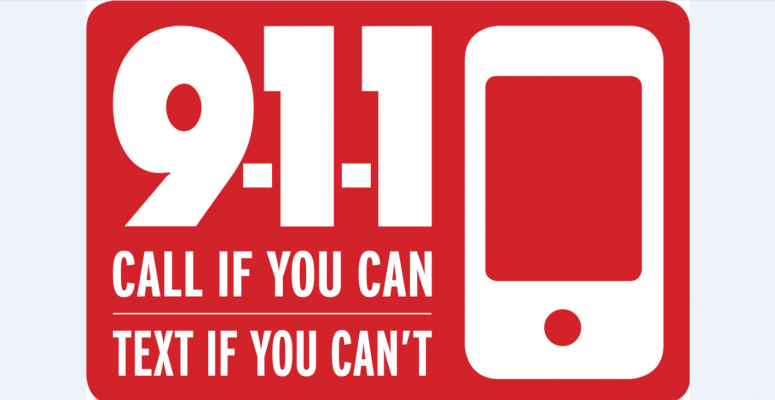In honor of the American with Disabilities Act’s (ADA’s) 30th Anniversary, the Arizona Center for Disability Law (ACDL) highlights its landmark ADA settlements under which Text-to-9-1-1 technology is being deployed throughout Arizona. This blog post gives background about the Enos et al v. Maricopa County and State of Arizona lawsuit and settlements and shares highlights from the State’s July 2020 Status Report. In this blog, you will also find links to a map and timeline showing when Text-to-9-1-1 will be available in each county awaiting implementation.
THE LAWSUIT
In 2016, the Arizona Center for Disability Law (ACDL) and Stein and Vargas, a Washington, D.C. based law firm, filed a lawsuit on behalf of the National Association of the Deaf (NAD) and Maricopa County residents Terri Guy, Norbert Enos, and Julian Singleton against the State and various public agencies in Maricopa County. The lawsuit alleged that the ADA, Section 504 of the Rehabilitation Act and the Arizonans with Disabilities Act require public entities to offer Text-to-9-1-1 services for citizens who are deaf or hard of hearing or have a speech impairment so that they may effectively communicate with 9-1-1 operators. It was the first lawsuit in the United States alleging that a failure to deploy technology to permit text-to-9-1-1 violated the ADA.
The lawsuit alleged that hearing individuals can reliably use their cellular phones to access emergency services to summon emergency medical help, or to report any number of emergency situations, such as fire, home invasion, assault, domestic violence, or even an Amber Alert tip, without wasting precious seconds looking for a public telephone or landline. Today, people who are deaf, hard of hearing, and speech-challenged use texting, videophones, social media, smartphone apps, and other technologies for their telecommunications needs. Text messaging allows a degree of quality and speed in telecommunication access for those individuals that was previously unimaginable and has drastically increased the interactivity of communication.
Technological advances like text messaging now offer deaf, hard of hearing, and speech-challenged individuals the ability to gain meaningful access to emergency telecommunications services (911).
U.S. District Judge John J. Tuchi denied the government agencies’ joint motions to dismiss the lawsuit and ruled that the lawsuit could proceed. After the governments’ motion to dismiss failed, the parties entered into extensive settlement negotiations that will lead to statewide implementation of Text-to-9-1-1.
THE SETTLEMENTS
The lawsuit resulted in two settlements: first, with the Maricopa Association of Governments (MAG) and second, with the State of Arizona.
In March 2018, Judge Tuchi approved a settlement between plaintiffs and Maricopa Association of Governments (MAG) that led to Text-to-9-1-1’s launch in April 2018 in Maricopa County.
On June 12, 2018, the court approved a second settlement between NAD, the three Maricopa County residents and the State establishing a $1.36 million fund that would cover the projected cost for Text-to-9-1-1’s initial deployment and the recurring costs for five years in each county. The settlement required the State to provide periodic reports about the status of Text-to-9-1-1 implementation.
SEVEN THINGS YOU SHOULD KNOW ABOUT TEXT-TO-9-1-1 IMPLEMENTATION
Here are highlights from the State’s July 2020 Status report outlining the implementation of Text-to-9-1-1 in Arizona.
- The Arizona Department of Administration’s Arizona 9-1-1 Program made funding available for Arizona counties to implement Text-to-9-1-1 services beginning August 3, 2018.
- All counties have applied and been approved for settlement funds.
- Text-to-9-1-1 is NOW available in the following counties: Maricopa County, Gila County, La Paz County, Mohave County and Yuma County.
- The Arizona Department of Public Safety implemented Text-to-9-1-1.
- Funds have been approved to implement Text-to-9-1-1 in the following counties and implementation is underway in Cochise County, Coconino County, Graham County, Greenlee County, Pima County and Pinal County.
- Full statewide Text-to-9-1-1 deployment is tentatively scheduled to be completed by June 30, 2021.
- If Text-to-91-1 is available in your area, here is what you need to do to contact 9-1-1 during an emergency: open a new text message in your phone’s messaging app, enter 911 as the recipient, type your message and hit “send.”
FOR MORE INFORMATION
The State created a webpage with information about the settlement and Text-to-9-1-1 implementation. On the settlement webpage, you can view the following:
- the Settlement
- Text to 9-1-1 Status Map
- The Current Status Report
- Go to page 5 to see a timeline of when Text-to-9-1-1 will be deployed in the remaining counties.
ACDL Attorneys Asim Dietrich and Rose Daly-Rooney and former ACDL Attorney Chris Carlsen handled this matter.
DISCLAIMER:
THIS BLOG/WEB SITE IS MADE AVAILABLE BY ACDL AND ITS LEGAL STAFF FOR EDUCATIONAL PURPOSES TO GIVE YOU GENERAL INFORMATION AND A GENERAL UNDERSTANDING OF THE LAW, NOT TO PROVIDE SPECIFIC LEGAL ADVICE. BY USING THIS BLOG SITE, YOU UNDERSTAND THAT THERE IS NO ATTORNEY-CLIENT RELATIONSHIP BETWEEN YOU AND ACDL. THE GENERAL INFORMATION ON THE BLOG/WEBSITE SHOULD NOT BE USED AS A SUBSTITUTE FOR COMPETENT LEGAL ADVICE FROM A LICENSED PROFESSIONAL ATTORNEY IN YOUR STATE. COMMENTING ON A POST DOES NOT CONSTITUTE AN INTAKE WITH ACDL. IF YOU WOULD LIKE TO REQUEST LEGAL ADVICE OR SERVICES CLICK HERE FOR INFORMATION ABOUT OUR INTAKE STEPS.


0 Comments